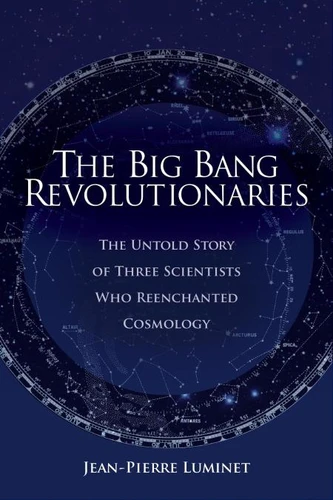The Big Bang Revolutionaries
Par :Formats :
Disponible dans votre compte client Decitre ou Furet du Nord dès validation de votre commande. Le format ePub est :
- Compatible avec une lecture sur My Vivlio (smartphone, tablette, ordinateur)
- Compatible avec une lecture sur liseuses Vivlio
- Pour les liseuses autres que Vivlio, vous devez utiliser le logiciel Adobe Digital Edition. Non compatible avec la lecture sur les liseuses Kindle, Remarkable et Sony
 , qui est-ce ?
, qui est-ce ?Notre partenaire de plateforme de lecture numérique où vous retrouverez l'ensemble de vos ebooks gratuitement
Pour en savoir plus sur nos ebooks, consultez notre aide en ligne ici
- FormatePub
- ISBN978-1-63712-041-5
- EAN9781637120415
- Date de parution23/04/2024
- Protection num.pas de protection
- Infos supplémentairesepub
- ÉditeurDiscovery Institute Press
Résumé
Many widely read scientific writers of our day mistakenly attribute the concepts of the expanding universe and the Big Bang to Edwin Hubble and Albert Einstein. Hubble did provide evidence of an expanding universe, but he neither discovered such evidence nor accepted the radical idea that space itself was expanding. As for Einstein, he held out against the idea of an expanding universe for more than a decade, and ceased working in the field as soon as he had to amend his view.
The real heroes of the Big Bang revolution are the Russian Alexander Friedmann and Belgian priest Georges Lemaître. That they are virtually unknown to the general public is one thing. That their contribution is underestimated by astrophysicists and cosmologists is another, for the concepts they promulgated are among the most remarkable achievements of twentieth-century science. The Big Bang Revolutionaries amends the record, telling the remarkable story of how these two men, joined by the mischievous George Gamow and in the face of conventional scientific wisdom, offered a compelling view of a singular creation of the universe in what Lemaître termed a "primeval atom."
The real heroes of the Big Bang revolution are the Russian Alexander Friedmann and Belgian priest Georges Lemaître. That they are virtually unknown to the general public is one thing. That their contribution is underestimated by astrophysicists and cosmologists is another, for the concepts they promulgated are among the most remarkable achievements of twentieth-century science. The Big Bang Revolutionaries amends the record, telling the remarkable story of how these two men, joined by the mischievous George Gamow and in the face of conventional scientific wisdom, offered a compelling view of a singular creation of the universe in what Lemaître termed a "primeval atom."
Many widely read scientific writers of our day mistakenly attribute the concepts of the expanding universe and the Big Bang to Edwin Hubble and Albert Einstein. Hubble did provide evidence of an expanding universe, but he neither discovered such evidence nor accepted the radical idea that space itself was expanding. As for Einstein, he held out against the idea of an expanding universe for more than a decade, and ceased working in the field as soon as he had to amend his view.
The real heroes of the Big Bang revolution are the Russian Alexander Friedmann and Belgian priest Georges Lemaître. That they are virtually unknown to the general public is one thing. That their contribution is underestimated by astrophysicists and cosmologists is another, for the concepts they promulgated are among the most remarkable achievements of twentieth-century science. The Big Bang Revolutionaries amends the record, telling the remarkable story of how these two men, joined by the mischievous George Gamow and in the face of conventional scientific wisdom, offered a compelling view of a singular creation of the universe in what Lemaître termed a "primeval atom."
The real heroes of the Big Bang revolution are the Russian Alexander Friedmann and Belgian priest Georges Lemaître. That they are virtually unknown to the general public is one thing. That their contribution is underestimated by astrophysicists and cosmologists is another, for the concepts they promulgated are among the most remarkable achievements of twentieth-century science. The Big Bang Revolutionaries amends the record, telling the remarkable story of how these two men, joined by the mischievous George Gamow and in the face of conventional scientific wisdom, offered a compelling view of a singular creation of the universe in what Lemaître termed a "primeval atom."



